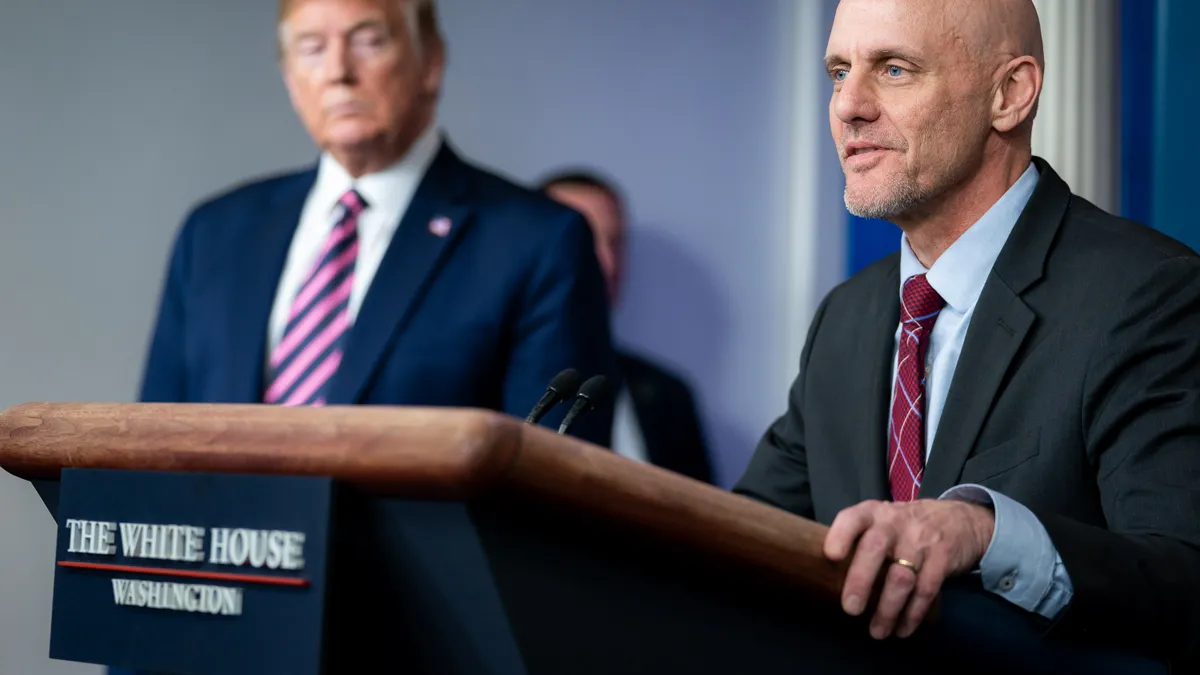Dive Brief:
- FDA is upping efforts to incorporate real-world data in evaluation of COVID-19 diagnostics and antibody tests, announcing Thursday participation in a partnership exploring how to use that data to improve testing quality, better inform population testing strategies and help understand how widespread the virus is.
- Using real-world data and evidence in regulatory decision-making for devices and drugs has been on FDA's agenda for a few years now. But the pandemic has sped up use of newly generated data in updating emergency use authorizations for coronavirus tests after giving the initial OK based on a limited amount of information, Commissioner Stephen Hahn said during a fireside chat with the Medical Device Innovation Consortium, a private-public partnership, Thursday afternoon.
- In recent weeks, the agency has demonstrated willingness to reverse course on which products are allowed during the public health emergency as additional insights on efficacy comes to light. FDA this week revoked the emergency use authorization for a COVID-19 antibody test from Chembio, one of the earliest of such tests to have received an EUA.
Dive Insight:
Real-world evidence covers clinical insights on potential benefits or risks of a medical product taken from real-world data — information derived from registries, electronic health records, claims and billing data, as well as mobile devices and other sources that reflect patients' actual use of products.
The need to better harness and consider those insights has gotten heightened attention at FDA in recent years. In 2016, FDA gave the Medical Device Innovation Consortium $3 million to get the National Evaluation System for health Technology Coordinating Center off the ground. NESTcc aims to research medical technologies using retrospective and active sources of RWD. The following year, the agency issued final guidance on using RWE to support regulatory decision-making for medical devices.
Since then, FDA has grappled with the role RWE can play in pre- and postmarket regulation of devices and drugs. With the agency leaning heavily on use of its EUA pathway during the COVID-19 public health emergency, the need to revisit and update authorizations once new evidence emerges on specific products and the virus itself is arguably more apparent now than ever before.
"You take the data you have, you take the information you have, you make decisions, and then you update it as you go based on new information," Hahn said during a Q&A with MDIC President Pamela Goldberg on Thursday. "And I think that's what we've seen here during this pandemic. It's what the agency has always strived to do, we've just done it in an accelerated timetable."
Hahn said the agency has tried to best balance the need for speedy access to products that can help in the fight against coronavirus while continuing to ensure safety and effectiveness and being transparent about its processes. Still, "in a fast-moving pandemic, that's been a challenge," he said.
FDA has been criticized for getting that balance wrong in some cases. The agency allowed scores of antibody tests onto the market without agency review under an umbrella-type policy aimed at increasing the volume of tests available. Many of those tests were found to have high rates of false results, prompting FDA to later order some off the market and require EUAs for all test makers wishing to continue selling a product.
Thursday's announcement on FDA's participation in the COVID-19 Diagnostics Evidence Accelerator could help. The initiative is organized by the Reagan-Udall Foundation, a nonprofit that supports FDA, and Friends of Cancer Research, following a similar accelerator focused on therapeutics. Among other efforts, the diagnostics accelerator will tackle a key question in understanding of the novel coronavirus: whether the presence of antibodies signals protection against future infection, and if so, which ones help.
“We recognize that questions related to the accuracy of diagnostic tests require different data elements that are not as widely available as those in the therapeutic space. They also require a different approach to data integration and analysis,” Center for Devices and Radiological Health Director Jeff Shuren said in a statement. “Ultimately, we hope that real-world data can provide a more generalizable and rapid read-out of results than traditional clinical trials.”
On both the diagnostics and therapeutics fronts, the agency also said in mid-May it was engaging Aetion, a New York-based healthcare technology company that specializes in analyzing RWE for payers, providers and regulators, to address questions about tests and medications as well as risk factors for COVID-19 complications in various patient populations. The agency also said it's leveraging Sentinel, its electronic system used to surveil medical product safety.
FDA's focus on using real-world evidence will continue beyond the current COVID-19 pandemic, Hahn said.
"Now as we look forward, we need to think about how real-world evidence fits into the initial authorization or approval of a product," he said. "But on the backend, postmarketing end of this after an approval, what data can we collect to look at really how these devices, how the tests operate, how they perform, and then incorporate that back in?"











